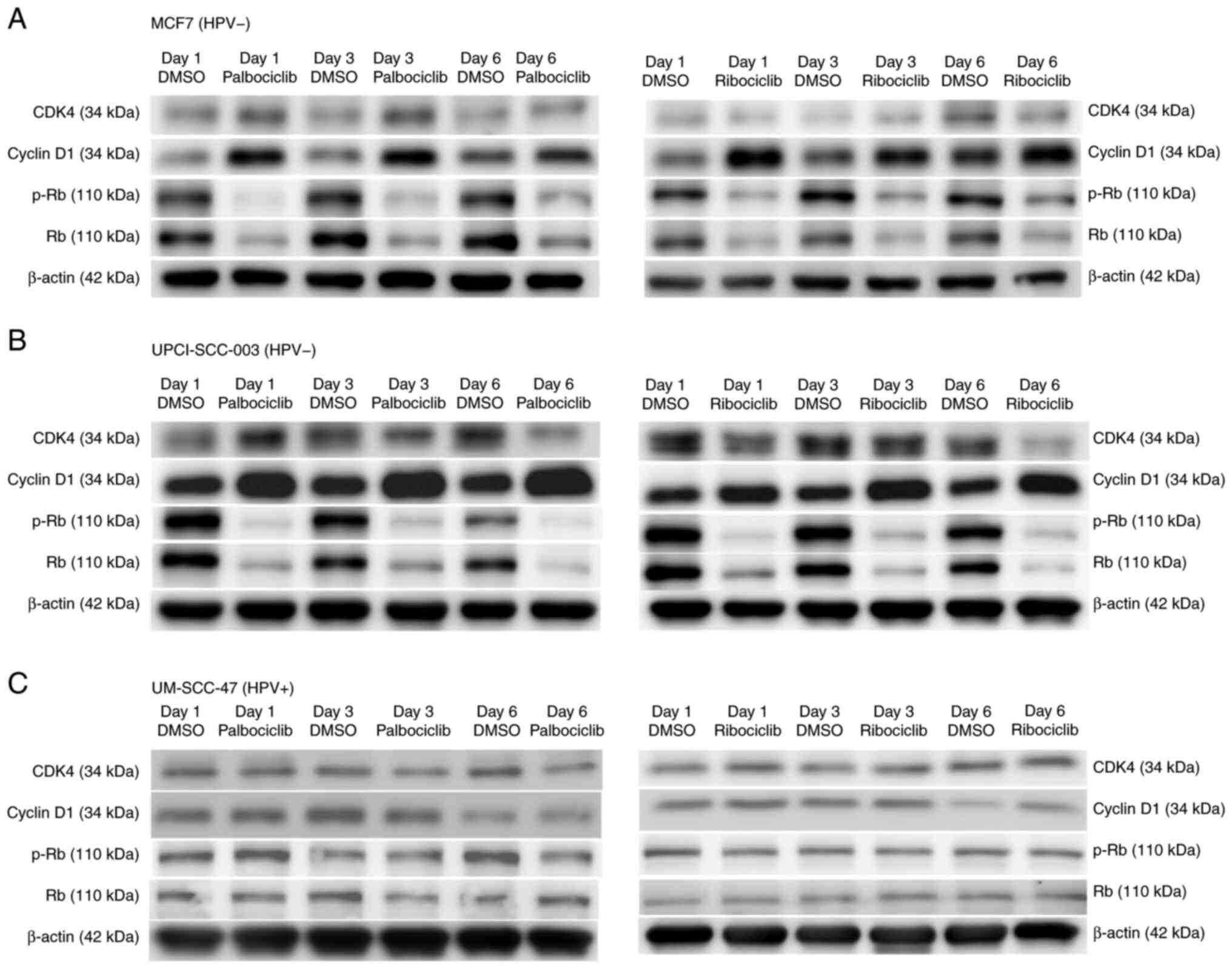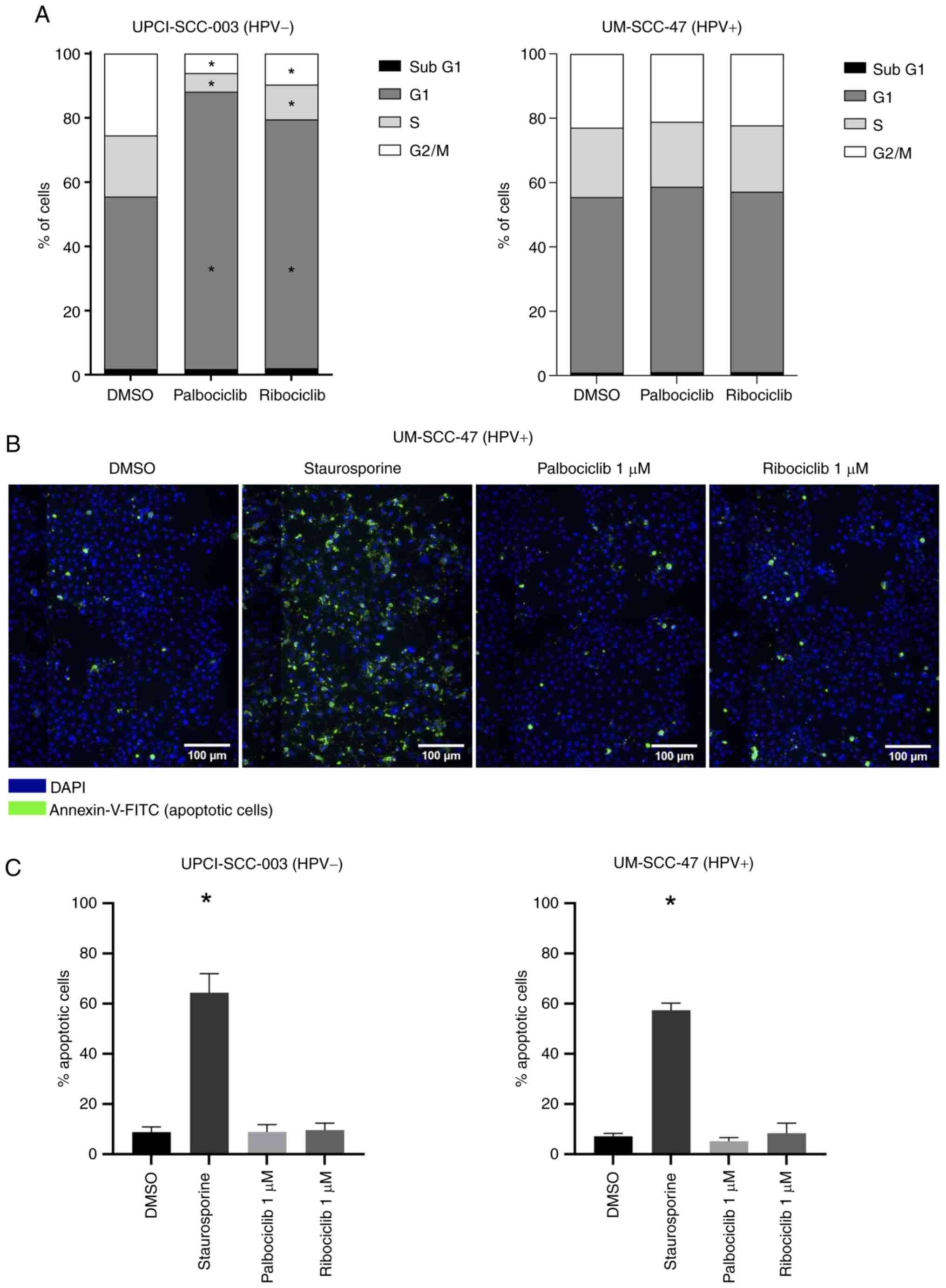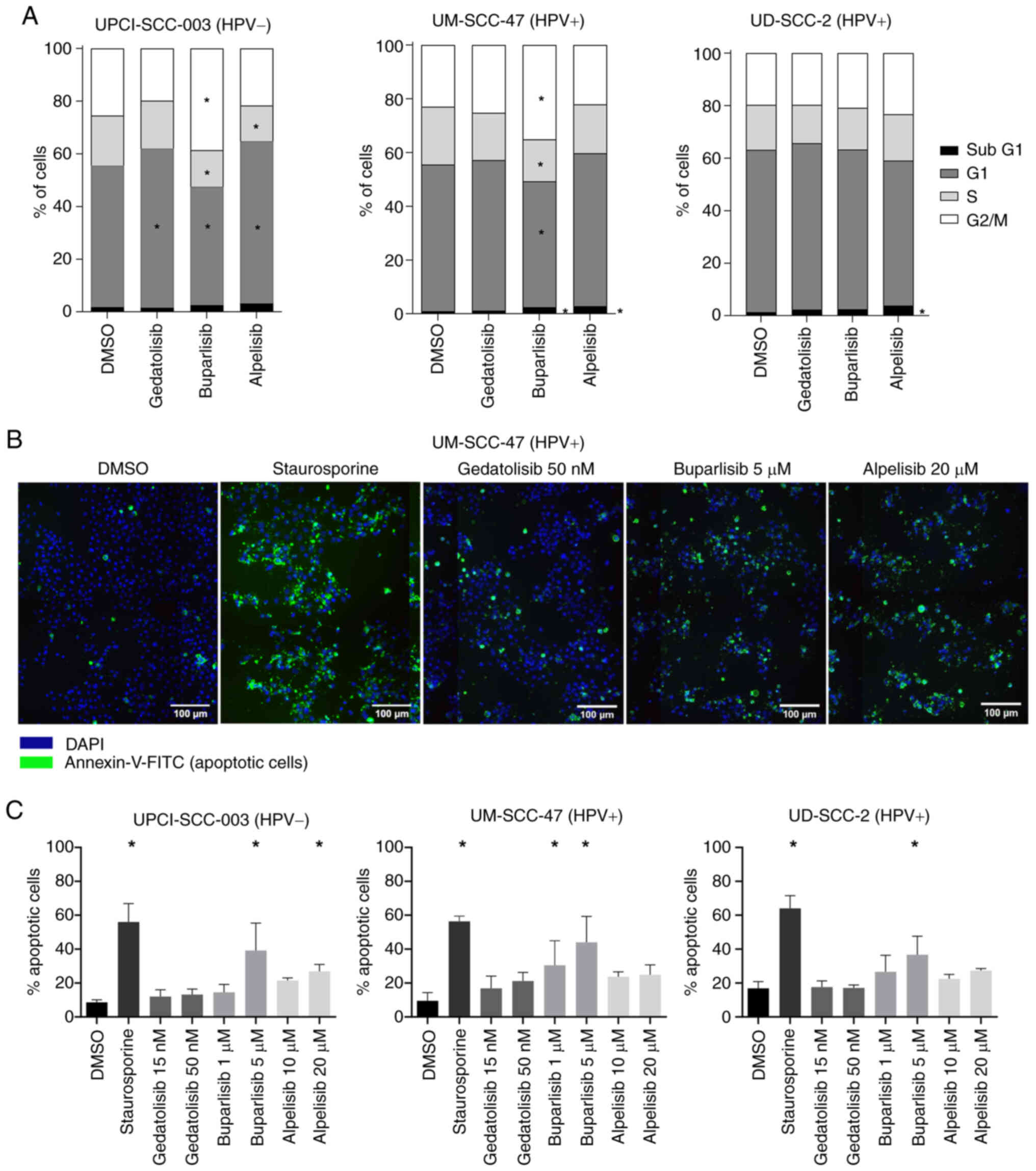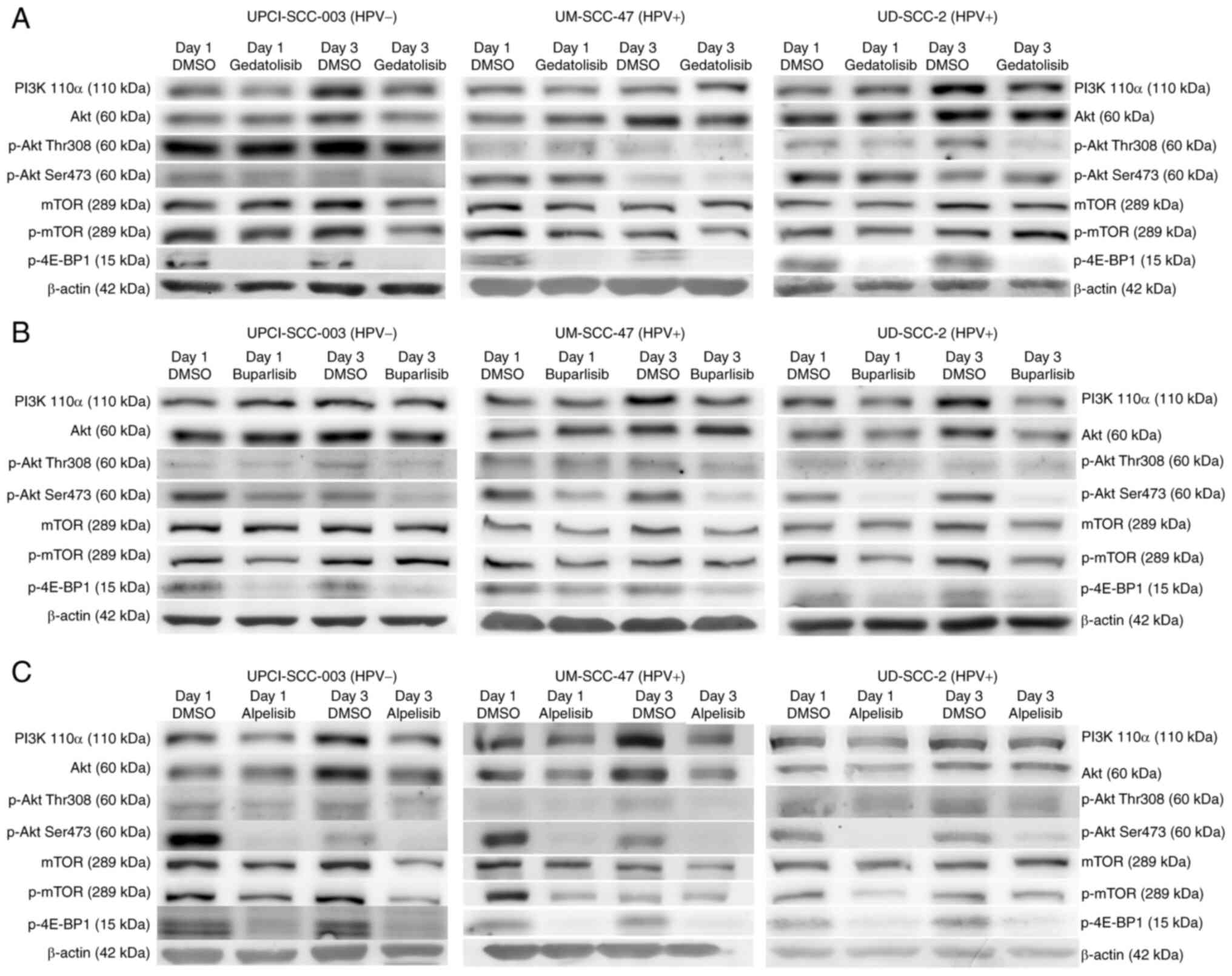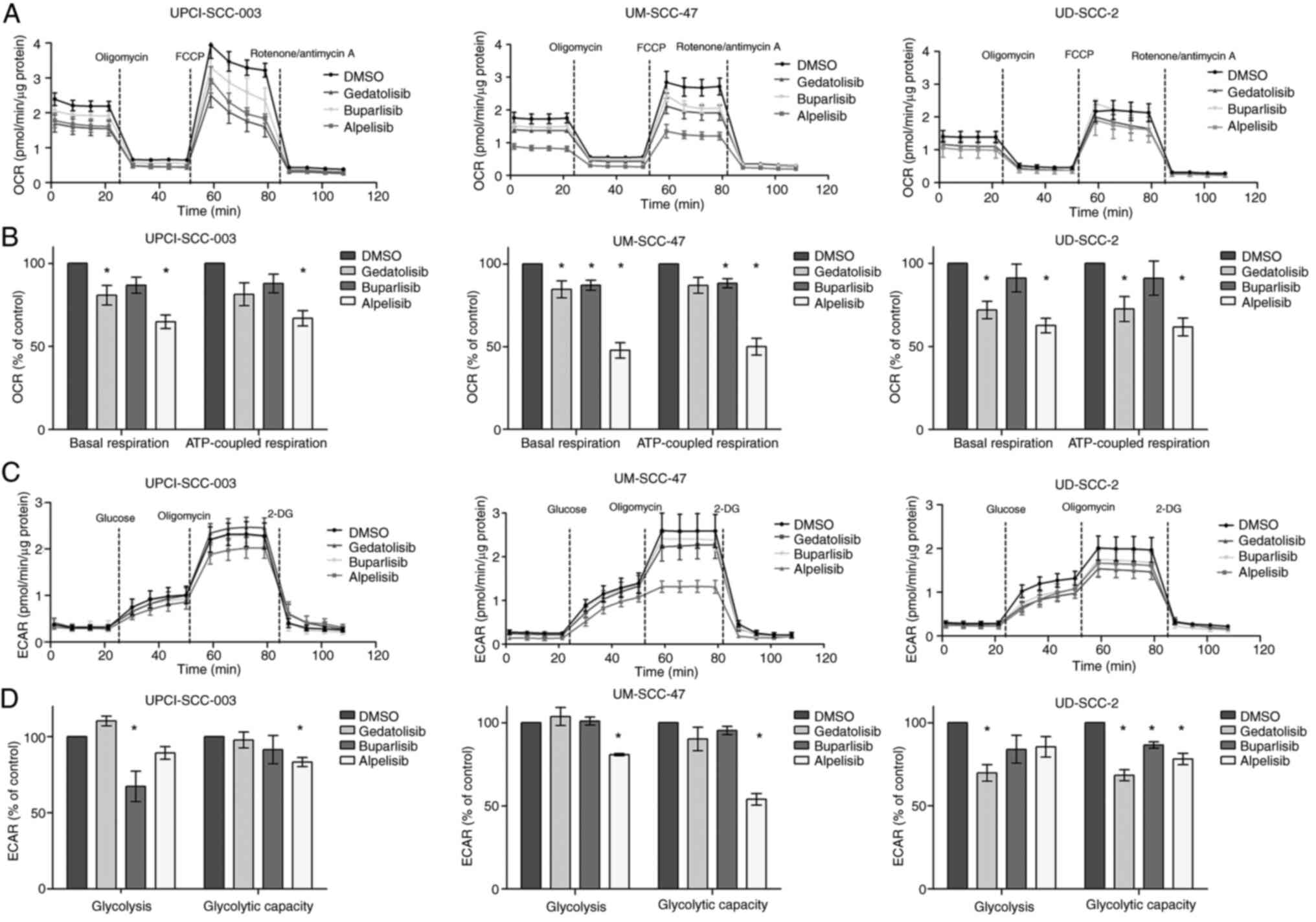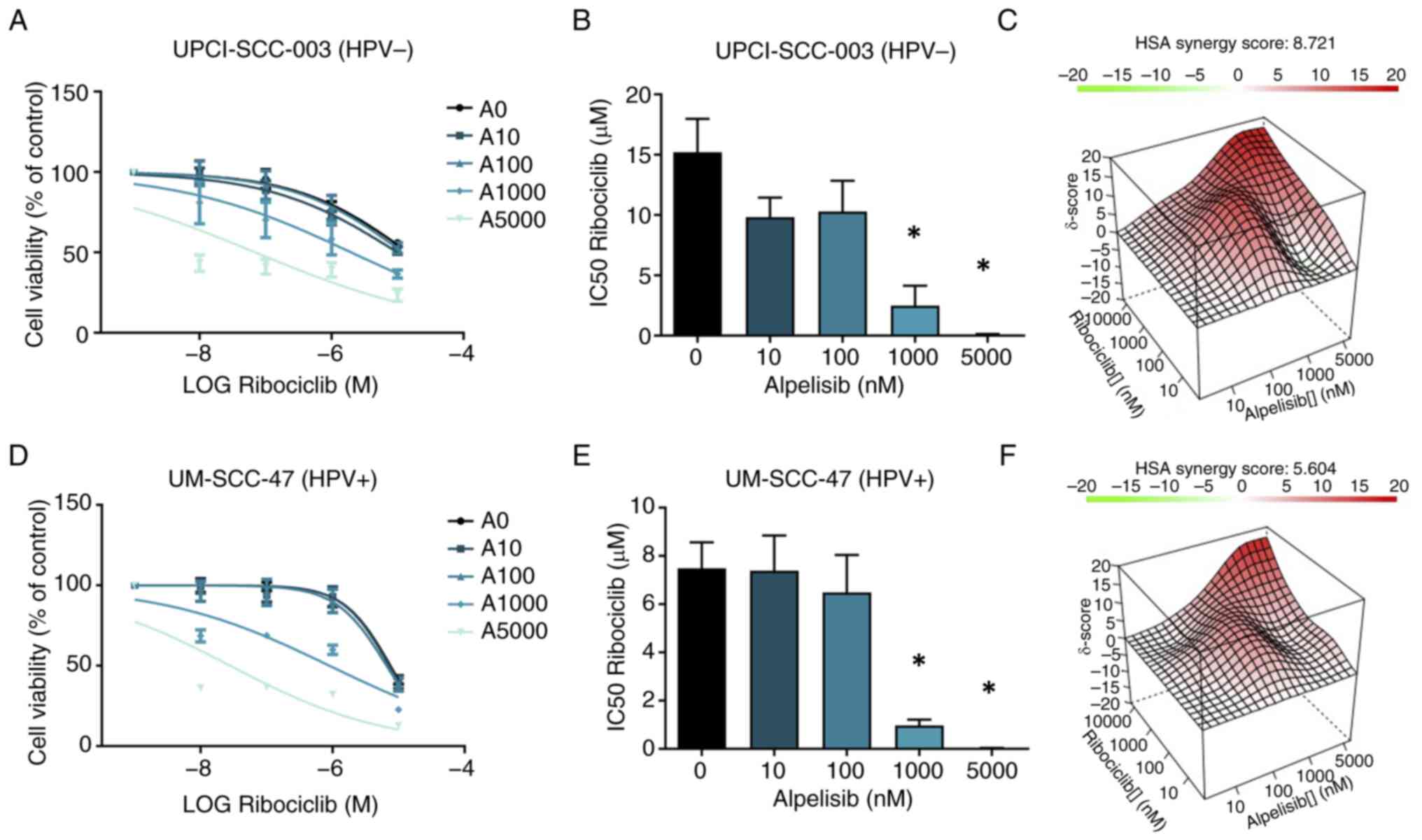|
1
|
Siegel R, Naishadham D and Jemal A: Cancer
statistics, 2013. CA Cancer J Clin. 63:11–30. 2013. View Article : Google Scholar : PubMed/NCBI
|
|
2
|
Bann DV, Deschler DG and Goyal N: Novel
immunotherapeutic approaches for head and neck squamous cell
carcinoma. Cancers (Basel). 8:872016. View Article : Google Scholar : PubMed/NCBI
|
|
3
|
Jemal A, Siegel R, Ward E, Hao Y, Xu J,
Murray T and Thun MJ: Cancer statistics, 2008. CA Cancer J Clin.
58:71–96. 2008. View Article : Google Scholar : PubMed/NCBI
|
|
4
|
Gillison ML, Chaturvedi AK, Anderson WF
and Fakhry C: Epidemiology of human papillomavirus-positive head
and neck squamous cell carcinoma. J Clin Oncol. 33:3235–3242. 2015.
View Article : Google Scholar : PubMed/NCBI
|
|
5
|
Stransky N, Egloff AM, Tward AD, Kostic
AD, Cibulskis K, Sivachenko A, Kryukov GV, Lawrence MS, Sougnez C,
McKenna A, et al: The mutational landscape of head and neck
squamous cell carcinoma. Science. 333:1157–1160. 2011. View Article : Google Scholar : PubMed/NCBI
|
|
6
|
Hafkamp HC, Manni JJ, Haesevoets A, Voogd
AC, Schepers M, Bot FJ, Hopman AHN, Ramaekers FC and Speel EJM:
Marked differences in survival rate between smokers and nonsmokers
with HPV 16-associated tonsillar carcinomas. Int J Cancer.
122:2656–2664. 2008. View Article : Google Scholar : PubMed/NCBI
|
|
7
|
Rosenquist K, Wennerberg J, Annertz K,
Schildt EB, Hansson BG, Bladström A and Andersson G: Recurrence in
patients with oral and oropharyngeal squamous cell carcinoma: Human
papillomavirus and other risk factors. Acta Otolaryngol.
127:980–987. 2007. View Article : Google Scholar : PubMed/NCBI
|
|
8
|
Furness S, Glenny AM, Worthington HV,
Pavitt S, Oliver R, Clarkson JE, Macluskey M, Chan KK and Conway
DI: Interventions for the treatment of oral cavity and
oropharyngeal cancer: Chemotherapy. Cochrane Database Syst Rev.
Cd0063862011.PubMed/NCBI
|
|
9
|
Machiels JP, René Leemans C, Golusinski W,
Grau C, Licitra L and Gregoire V; EHNS Executive Board; ESTRO
Executive Board: Electronic address: simplesecretariat@ehns.org;
ESMO Guidelines Committee. Electronic address: simpleclinicalguidelines@esmo.org.
Electronic address: simpleinfo@estro.org. Squamous
cell carcinoma of the oral cavitylarynx, oropharynx and
hypopharynx: EHNS-ESMO-ESTRO clinical practice guidelines for
diagnosis, treatment and follow-up. Ann Oncol. 31:1462–1475. 2020.
View Article : Google Scholar : PubMed/NCBI
|
|
10
|
Agrawal N, Frederick MJ, Pickering CR,
Bettegowda C, Chang K, Li RJ, Fakhry C, Xie TX, Zhang J, Wang J, et
al: Exome sequencing of head and neck squamous cell carcinoma
reveals inactivating mutations in NOTCH1. Science. 333:1154–1157.
2011. View Article : Google Scholar : PubMed/NCBI
|
|
11
|
Engelman JA: Targeting PI3K signalling in
cancer: Opportunities, challenges and limitations. Nat Rev Cancer.
9:550–562. 2009. View Article : Google Scholar : PubMed/NCBI
|
|
12
|
Liu P, Cheng H, Roberts TM and Zhao JJ:
Targeting the phosphoinositide 3-kinase pathway in cancer. Nat Rev
Drug Discov. 8:627–644. 2009. View Article : Google Scholar : PubMed/NCBI
|
|
13
|
Cancer Genome Atlas Network: Comprehensive
genomic characterization of head and neck squamous cell carcinomas.
Nature. 517:576–582. 2015. View Article : Google Scholar : PubMed/NCBI
|
|
14
|
Wu L, Timmers C, Maiti B, Saavedra HI,
Sang L, Chong GT, Nuckolls F, Giangrande P, Wright FA, Field SJ, et
al: The E2F1-3 transcription factors are essential for cellular
proliferation. Nature. 414:457–462. 2001. View Article : Google Scholar : PubMed/NCBI
|
|
15
|
Lim AM, Do H, Young RJ, Wong SQ, Angel C,
Collins M, Takano EA, Corry J, Wiesenfeld D, Kleid S, et al:
Differential mechanisms of CDKN2A (p16) alteration in oral tongue
squamous cell carcinomas and correlation with patient outcome. Int
J Cancer. 135:887–895. 2014. View Article : Google Scholar : PubMed/NCBI
|
|
16
|
Smeets SJ, Braakhuis BJM, Abbas S,
Snijders PJF, Ylstra B, van de Wiel MA, Meijer GA, Leemans CR and
Brakenhoff RH: Genome-wide DNA copy number alterations in head and
neck squamous cell carcinomas with or without oncogene-expressing
human papillomavirus. Oncogene. 25:2558–2564. 2006. View Article : Google Scholar
|
|
17
|
White JS, Weissfeld JL, Ragin CCR, Rossie
KM, Martin CL, Shuster M, Ishwad CS, Law JC, Myers EN, Johnson JT
and Gollin SM: The influence of clinical and demographic risk
factors on the establishment of head and neck squamous cell
carcinoma cell lines. Oral Oncol. 43:701–712. 2007. View Article : Google Scholar
|
|
18
|
Huang WC and Hung MC: Induction of Akt
activity by chemotherapy confers acquired resistance. J Formos Med
Assoc. 108:180–194. 2009. View Article : Google Scholar : PubMed/NCBI
|
|
19
|
Soulières D, Faivre S, Mesía R, Remenár É,
Li SH, Karpenko A, Dechaphunkul A, Ochsenreither S, Kiss LA, Lin
JC, et al: Buparlisib and paclitaxel in patients with
platinum-pretreated recurrent or metastatic squamous cell carcinoma
of the head and neck (BERIL-1): A randomised, double-blind,
placebo-controlled phase 2 trial. Lancet Oncol. 18:323–335. 2017.
View Article : Google Scholar : PubMed/NCBI
|
|
20
|
André F, Ciruelos EM, Juric D, Loibl S,
Campone M, Mayer IA, Rubovszky G, Yamashita T, Kaufman B, Lu YS, et
al: Alpelisib plus fulvestrant for PIK3CA-mutated, hormone
receptor-positive, human epidermal growth factor
receptor-2-negative advanced breast cancer: Final overall survival
results from SOLAR-1. Ann Oncol. 32:208–217. 2021. View Article : Google Scholar
|
|
21
|
Fry DW, Harvey PJ, Keller PR, Elliott WL,
Meade M, Trachet E, Albassam M, Zheng X, Leopold WR, Pryer NK and
Toogood PL: Specific inhibition of cyclin-dependent kinase 4/6 by
PD 0332991 and associated antitumor activity in human tumor
xenografts. Mol Cancer Ther. 3:1427–1438. 2004. View Article : Google Scholar : PubMed/NCBI
|
|
22
|
Kim S, Tiedt R, Loo A, Horn T, Delach S,
Kovats S, Haas K, Engstler BS, Cao A, Pinzon-Ortiz M, et al: The
potent and selective cyclin-dependent kinases 4 and 6 inhibitor
ribociclib (LEE011) is a versatile combination partner in
preclinical cancer models. Oncotarget. 9:35226–35240. 2018.
View Article : Google Scholar : PubMed/NCBI
|
|
23
|
Furet P, Guagnano V, Fairhurst RA,
Imbach-Weese P, Bruce I, Knapp M, Fritsch C, Blasco F, Blanz J,
Aichholz R, et al: Discovery of NVP-BYL719 a potent and selective
phosphatidylinositol-3 kinase alpha inhibitor selected for clinical
evaluation. Bioorg Med Chem Lett. 23:3741–3748. 2013. View Article : Google Scholar : PubMed/NCBI
|
|
24
|
Fritsch C, Huang A, Chatenay-Rivauday C,
Schnell C, Reddy A, Liu M, Kauffmann A, Guthy D, Erdmann D, De
Pover A, et al: Characterization of the novel and specific PI3Kα
inhibitor NVP-BYL719 and development of the patient stratification
strategy for clinical trials. Mol Cancer Ther. 13:1117–1129. 2014.
View Article : Google Scholar : PubMed/NCBI
|
|
25
|
Maira SM, Pecchi S, Huang A, Burger M,
Knapp M, Sterker D, Schnell C, Guthy D, Nagel T, Wiesmann M, et al:
Identification and characterization of NVP-BKM120, an orally
available pan-class I PI3-kinase inhibitor. Mol Cancer Ther.
11:317–328. 2012. View Article : Google Scholar
|
|
26
|
Mallon R, Feldberg LR, Lucas J, Chaudhary
I, Dehnhardt C, Santos ED, Chen Z, dos Santos O, Ayral-Kaloustian
S, Venkatesan A and Hollander I: Antitumor efficacy of PKI-587, a
highly potent dual PI3K/mTOR kinase inhibitor. Clin Cancer Res.
17:3193–3203. 2011. View Article : Google Scholar : PubMed/NCBI
|
|
27
|
Piboonniyom SO, Duensing S, Swilling NW,
Hasskarl J, Hinds PW and Münger K: Abrogation of the retinoblastoma
tumor suppressor checkpoint during keratinocyte immortalization is
not sufficient for induction of centrosome-mediated genomic
instability. Cancer Res. 63:476–483. 2003.PubMed/NCBI
|
|
28
|
Krisanaprakornkit S, Weinberg A, Perez CN
and Dale BA: Expression of the peptide antibiotic human
beta-defensin 1 in cultured gingival epithelial cells and gingival
tissue. Infect Immun. 66:4222–4228. 1998. View Article : Google Scholar : PubMed/NCBI
|
|
29
|
Piboonniyom SO, Timmermann S, Hinds P and
Münger K: Aberrations in the MTS1 tumor suppressor locus in oral
squamous cell carcinoma lines preferentially affect the INK4A gene
and result in increased cdk6 activity. Oral Oncol. 38:179–186.
2002. View Article : Google Scholar : PubMed/NCBI
|
|
30
|
Eijkelenboom A, Kamping EJ, Kastner-van
Raaij AW, Hendriks-Cornelissen SJ, Neveling K, Kuiper RP, Hoischen
A, Nelen MR, Ligtenberg MJJ and Tops BBJ: Reliable next-generation
sequencing of formalin-fixed, paraffin-embedded tissue using single
molecule tags. J Mol Diagn. 18:851–863. 2016. View Article : Google Scholar : PubMed/NCBI
|
|
31
|
Olthof NC, Huebbers CU, Kolligs J,
Henfling M, Ramaekers FCS, Cornet I, van Lent-Albrechts JA,
Stegmann APA, Silling S, Wieland U, et al: Viral load, gene
expression and mapping of viral integration sites in
HPV16-associated HNSCC cell lines. Int J Cancer. 136:E207–E218.
2015. View Article : Google Scholar
|
|
32
|
Hafkamp HC, Speel EJM, Haesevoets A, Bot
FJ, Dinjens WNM, Ramaekers FCS, Hopman AHN and Manni JJ: A subset
of head and neck squamous cell carcinomas exhibits integration of
HPV 16/18 DNA and overexpression of p16INK4A and p53 in the absence
of mutations in p53 exons 5-8. Int J Cancer. 107:394–400. 2003.
View Article : Google Scholar : PubMed/NCBI
|
|
33
|
de Roda Husman AM, Walboomers JM, van den
Brule AJ, Meijer CJ and Snijders PJ: The use of general primers GP5
and GP6 elongated at their 3′ ends with adjacent highly conserved
sequences improves human papillomavirus detection by PCR. J Gen
Virol. 76:1057–1062. 1995. View Article : Google Scholar
|
|
34
|
Mosmann T: Rapid colorimetric assay for
cellular growth and survival: Application to proliferation and
cytotoxicity assays. J Immunol Methods. 65:55–63. 1983. View Article : Google Scholar : PubMed/NCBI
|
|
35
|
Maehara Y, Anai H, Tamada R and Sugimachi
K: The ATP assay is more sensitive than the succinate dehydrogenase
inhibition test for predicting cell viability. Eur J Cancer Clin
Oncol. 23:273–276. 1987. View Article : Google Scholar : PubMed/NCBI
|
|
36
|
Duarte D, Cardoso A and Vale N:
Synergistic growth inhibition of HT-29 colon and MCF-7 breast
cancer cells with simultaneous and sequential combinations of
antineoplastics and CNS drugs. Int J Mol Sci. 22:74082021.
View Article : Google Scholar : PubMed/NCBI
|
|
37
|
Ianevski A, Giri AK and Aittokallio T:
SynergyFinder 2.0: Visual analytics of multi-drug combination
synergies. Nucleic Acids Res. 48(W1): W488–W493. 2020. View Article : Google Scholar : PubMed/NCBI
|
|
38
|
Grillo M, Bott MJ, Khandke N, McGinnis JP,
Miranda M, Meyyappan M, Rosfjord EC and Rabindran SK: Validation of
cyclin D1/CDK4 as an anticancer drug target in MCF-7 breast cancer
cells: Effect of regulated overexpression of cyclin D1 and
siRNA-mediated inhibition of endogenous cyclin D1 and CDK4
expression. Breast Cancer Res Treat. 95:185–194. 2006. View Article : Google Scholar
|
|
39
|
Herrera-Abreu MT, Palafox M, Asghar U,
Rivas MA, Cutts RJ, Garcia-Murillas I, Pearson A, Guzman M,
Rodriguez O, Grueso J, et al: Early adaptation and acquired
resistance to CDK4/6 inhibition in estrogen receptor-positive
breast cancer. Cancer Res. 76:2301–2313. 2016. View Article : Google Scholar : PubMed/NCBI
|
|
40
|
Billard-Sandu C, Tao YG, Sablin MP,
Dumitrescu G, Billard D and Deutsch E: CDK4/6 inhibitors in
P16/HPV16-negative squamous cell carcinoma of the head and neck.
Eur Arch Otorhinolaryngol. 277:1273–1280. 2020. View Article : Google Scholar : PubMed/NCBI
|
|
41
|
Marquard FE and Jücker M: PI3K/AKT/mTOR
signaling as a molecular target in head and neck cancer. Biochem
Pharmacol. 172:1137292020. View Article : Google Scholar
|
|
42
|
Zainal NS, Lee BKB, Wong ZW, Chin IS, Yee
PS, Gan CP, Mun KS, Rahman ZAA, Gutkind JS, Patel V and Cheong SC:
Effects of palbociclib on oral squamous cell carcinoma and the role
of PIK3CA in conferring resistance. Cancer Biol Med. 16:264–275.
2019. View Article : Google Scholar : PubMed/NCBI
|
|
43
|
Finn RS, Dering J, Conklin D, Kalous O,
Cohen DJ, Desai AJ, Ginther C, Atefi M, Chen I, Fowst C, et al: PD
0332991, a selective cyclin D kinase 4/6 inhibitor, preferentially
inhibits proliferation of luminal estrogen receptor-positive human
breast cancer cell lines in vitro. Breast Cancer Res. 11:R772009.
View Article : Google Scholar : PubMed/NCBI
|
|
44
|
Wagner V and Gil J: Senescence as a
therapeutically relevant response to CDK4/6 inhibitors. Oncogene.
39:5165–5176. 2020. View Article : Google Scholar : PubMed/NCBI
|
|
45
|
Wang TH, Chen CC, Leu YL, Lee YS, Lian JH,
Hsieh HL and Chen CY: Palbociclib induces DNA damage and inhibits
DNA repair to induce cellular senescence and apoptosis in oral
squamous cell carcinoma. J Formos Med Assoc. 120:1695–1705. 2021.
View Article : Google Scholar
|
|
46
|
Adkins D, Ley J, Neupane P, Worden F,
Sacco AG, Palka K, Grilley-Olson JE, Maggiore R, Salama NN,
Trinkaus K, et al: Palbociclib and cetuximab in platinum-resistant
and in cetuximab-resistant human papillomavirus-unrelated head and
neck cancer: A multicentre, multigroup, phase 2 trial. Lancet
Oncol. 20:1295–1305. 2019. View Article : Google Scholar : PubMed/NCBI
|
|
47
|
Hawkins PT, Anderson KE, Davidson K and
Stephens LR: Signalling through class I PI3Ks in mammalian cells.
Biochem Soc Trans. 34:647–662. 2006. View Article : Google Scholar : PubMed/NCBI
|
|
48
|
Garces AE and Stocks MJ: Class 1 PI3K
clinical candidates and recent inhibitor design strategies: A
medicinal chemistry perspective. J Med Chem. 62:4815–4850. 2019.
View Article : Google Scholar
|
|
49
|
Miller MS, Thompson PE and Gabelli SB:
Structural determinants of isoform selectivity in PI3K inhibitors.
Biomolecules. 9:822019. View Article : Google Scholar : PubMed/NCBI
|
|
50
|
Costa C, Ebi H, Martini M, Beausoleil SA,
Faber AC, Jakubik CT, Huang A, Wang Y, Nishtala M, Hall B, et al:
Measurement of PIP3 levels reveals an unexpected role for p110β in
early adaptive responses to p110α-specific inhibitors in luminal
breast cancer. Cancer Cell. 27:97–108. 2015. View Article : Google Scholar
|
|
51
|
Di Leo A, Johnston S, Lee KS, Ciruelos E,
Lønning PE, Janni W, O'Regan R, Mouret-Reynier MA, Kalev D, Egle D,
et al: Buparlisib plus fulvestrant in postmenopausal women with
hormone-receptor-positive, HER2-negative, advanced breast cancer
progressing on or after mTOR inhibition (BELLE-3): A randomised,
double-blind, placebo-controlled, phase 3 trial. Lancet Oncol.
19:87–100. 2018. View Article : Google Scholar
|
|
52
|
Brachmann SM, Kleylein-Sohn J, Gaulis S,
Kauffmann A, Blommers MJJ, Kazic-Legueux M, Laborde L, Hattenberger
M, Stauffer F, Vaxelaire J, et al: Characterization of the
mechanism of action of the pan class I PI3K inhibitor NVP-BKM120
across a broad range of concentrations. Mol Cancer Ther.
11:1747–1757. 2012. View Article : Google Scholar : PubMed/NCBI
|
|
53
|
Koul D, Shen R, LaFortune TA, Tiao N, Kim
YW, Liu JL, Maira SM, Garcia-Echeverria C and Yung WKA: Abstract
350: NVP-BKM120: A selective pan-PI3 kinase inhibitor induces G2/M
arrest in glioma cell lines via FOXO3a and GADD45a loop. Cancer
Res. 70(8 Suppl): S3502010. View Article : Google Scholar
|
|
54
|
Sadeghi S, Esmaeili S,
Pourbagheri-Sigaroodi A, Safaroghli-Azar A and Bashash D: PI3K
abrogation using pan-PI3K inhibitor BKM120 gives rise to a
significant anticancer effect on AML-Derived KG-1 cells by inducing
apoptosis and G2/M arrest. Turk J Haematol. 37:167–176.
2020.PubMed/NCBI
|
|
55
|
Hoxhaj G and Manning BD: The PI3K-AKT
network at the interface of oncogenic signalling and cancer
metabolism. Nat Rev Cancer. 20:74–88. 2020. View Article : Google Scholar :
|
|
56
|
Valvezan AJ and Manning BD: Molecular
logic of mTORC1 signalling as a metabolic rheostat. Nat Metab.
1:321–333. 2019. View Article : Google Scholar : PubMed/NCBI
|
|
57
|
Hay N: The Akt-mTOR tango and its
relevance to cancer. Cancer Cell. 8:179–183. 2005. View Article : Google Scholar : PubMed/NCBI
|
|
58
|
O'Reilly KE, Rojo F, She QB, Solit D,
Mills GB, Smith D, Lane H, Hofmann F, Hicklin DJ, Ludwig DL, et al:
mTOR inhibition induces upstream receptor tyrosine kinase signaling
and activates Akt. Cancer Res. 66:1500–1508. 2006. View Article : Google Scholar : PubMed/NCBI
|
|
59
|
Cheng H, Yang X, Si H, Saleh AD, Xiao W,
Coupar J, Gollin SM, Ferris RL, Issaeva N, Yarbrough WG, et al:
Genomic and transcriptomic characterization links cell lines with
aggressive head and neck cancers. Cell Rep. 25:1332–1345.e5. 2018.
View Article : Google Scholar : PubMed/NCBI
|
|
60
|
Huw LY, O'Brien C, Pandita A, Mohan S,
Spoerke JM, Lu S, Wang Y, Hampton GM, Wilson TR and Lackner MR:
Acquired PIK3CA amplification causes resistance to selective
phosphoinositide 3-kinase inhibitors in breast cancer. Oncogenesis.
2:e832013. View Article : Google Scholar : PubMed/NCBI
|
|
61
|
Zhang L, Wu J, Ling MT, Zhao L and Zhao
KN: The role of the PI3K/Akt/mTOR signalling pathway in human
cancers induced by infection with human papillomaviruses. Mol
Cancer. 14:872015. View Article : Google Scholar : PubMed/NCBI
|
|
62
|
Curry JM, Tuluc M, Whitaker-Menezes D,
Ames JA, Anantharaman A, Butera A, Leiby B, Cognetti DM, Sotgia F,
Lisanti MP and Martinez-Outschoorn UE: Cancer metabolism, stemness
and tumor recurrence: MCT1 and MCT4 are functional biomarkers of
metabolic symbiosis in head and neck cancer. Cell Cycle.
12:1371–1384. 2013. View Article : Google Scholar : PubMed/NCBI
|
|
63
|
Knight ZA, Gonzalez B, Feldman ME, Zunder
ER, Goldenberg DD, Williams O, Loewith R, Stokoe D, Balla A, Toth
B, et al: A pharmacological map of the PI3-K family defines a role
for p110alpha in insulin signaling. Cell. 125:733–747. 2006.
View Article : Google Scholar : PubMed/NCBI
|
|
64
|
Sopasakis VR, Liu P, Suzuki R, Kondo T,
Winnay J, Tran TT, Asano T, Smyth G, Sajan MP, Farese RV, et al:
Specific roles of the p110alpha isoform of phosphatidylinsositol
3-kinase in hepatic insulin signaling and metabolic regulation.
Cell Metab. 11:220–230. 2010. View Article : Google Scholar : PubMed/NCBI
|
|
65
|
Fruman DA and Rommel C: PI3K and cancer:
Lessons, challenges and opportunities. Nat Rev Drug Discov.
13:140–156. 2014. View Article : Google Scholar : PubMed/NCBI
|
|
66
|
Thorpe LM, Yuzugullu H and Zhao JJ: PI3K
in cancer: Divergent roles of isoforms, modes of activation and
therapeutic targeting. Nat Rev Cancer. 15:7–24. 2015. View Article : Google Scholar :
|
|
67
|
Karim S, Burzangi AS, Ahmad A, Siddiqui
NA, Ibrahim IM, Sharma P, Abualsunun WA and Gabr GA: PI3K-AKT
pathway modulation by thymoquinone limits tumor growth and
glyco-lytic metabolism in colorectal cancer. Int J Mol Sci.
23:23052022. View Article : Google Scholar
|
|
68
|
Udawant S, Litif C, Lopez A, Gunn B,
Schuenzel E and Keniry M: PI3K Pathway inhibition with NVP-BEZ235
hinders glycolytic metabolism in glioblastoma multiforme cells.
Cells. 10:30652021. View Article : Google Scholar : PubMed/NCBI
|
|
69
|
Alves LB, Moura AC, Amorim Dos Santos J,
Borges GA and Guerra ENS: Pharmacological PI3K inhibition in head
and neck squamous cell carcinoma: A systematic review. Toxicol In
Vitro. 88:1055582023. View Article : Google Scholar : PubMed/NCBI
|
|
70
|
Xu J, Li Y, Kang M, Chang C, Wei H, Zhang
C and Chen Y: Multiple forms of cell death: A focus on the PI3K/AKT
pathway. J Cell Physiol. 238:2026–2038. 2023. View Article : Google Scholar : PubMed/NCBI
|
|
71
|
O'Brien NA, McDermott MSJ, Conklin D, Luo
T, Ayala R, Salgar S, Chau K, DiTomaso E, Babbar N, Su F, et al:
Targeting activated PI3K/mTOR signaling overcomes acquired
resistance to CDK4/6-based therapies in preclinical models of
hormone receptor-positive breast cancer. Breast Cancer Res.
22:892020. View Article : Google Scholar : PubMed/NCBI
|
|
72
|
Goodwin CM, Waters AM, Klomp JE, Javaid S,
Bryant KL, Stalnecker CA, Drizyte-Miller K, Papke B, Yang R, Amparo
AM, et al: Combination therapies with CDK4/6 inhibitors to treat
KRAS-mutant pancreatic cancer. Cancer Res. 83:141–157. 2023.
View Article : Google Scholar :
|
|
73
|
Coppock JD, Wieking BG, Molinolo AA,
Gutkind JS, Miskimins WK and Lee JH: Improved clearance during
treatment of HPV-positive head and neck cancer through mTOR
inhibition. Neoplasia. 15:620–630. 2013. View Article : Google Scholar : PubMed/NCBI
|
|
74
|
Cassell A, Freilino ML, Lee J, Barr S,
Wang L, Panahandeh MC, Thomas SM and Grandis JR: Targeting TORC1/2
enhances sensitivity to EGFR inhibitors in head and neck cancer
preclinical models. Neoplasia. 14:1005–1014. 2012. View Article : Google Scholar : PubMed/NCBI
|
|
75
|
Seiwert TY, Kochanny S, Wood K, Worden FP,
Adkins D, Wade JL, Sleckman BG, Anderson D, Brisson RJ, Karrison T,
et al: A randomized phase 2 study of temsirolimus and cetuximab
versus temsirolimus alone in recurrent/metastatic,
cetuximab-resistant head and neck cancer: The MAESTRO study.
Cancer. 126:3237–3243. 2020. View Article : Google Scholar : PubMed/NCBI
|
|
76
|
Bautista F, Paoletti X, Rubino J, Brard C,
Rezai K, Nebchi S, Andre N, Aerts I, De Carli E, van Eijkelenburg
N, et al: Phase I or II study of ribociclib in combination with
topotecan-temozolomide or everolimus in children with advanced
malignancies: Arms A and B of the AcSé-ESMART trial. J Clin Oncol.
39:3546–3560. 2021. View Article : Google Scholar : PubMed/NCBI
|
|
77
|
Bardia A, Modi S, Oliveira M, Cortes J,
Campone M, Ma B, Dirix L, Weise A, Hewes B, Diaz-Padilla I, et al:
Phase Ib dose-escalation/expansion trial of ribociclib in
combination with everolimus and exemestane in postmenopausal women
with HR+, HER2-advanced breast cancer. Clin Cancer Res.
26:6417–6428. 2020. View Article : Google Scholar : PubMed/NCBI
|
|
78
|
Wright SCE, Vasilevski N, Serra V, Rodon J
and Eichhorn PJA: Mechanisms of resistance to PI3K inhibitors in
cancer: Adaptive responses, drug tolerance and cellular plasticity.
Cancers (Basel). 13:15382021. View Article : Google Scholar : PubMed/NCBI
|
|
79
|
Song KW, Edgar KA, Hanan EJ, Hafner M, Oeh
J, Merchant M, Sampath D, Nannini MA, Hong R, Phu L, et al:
RTK-dependent inducible degradation of mutant PI3Kα drives GDC-0077
(Inavolisib) efficacy. Cancer Discov. 12:204–219. 2022. View Article : Google Scholar
|
|
80
|
Demers I, Donkers J, Kremer B and Speel
EJ: Ex vivo culture models to indicate therapy response in head and
neck squamous cell carcinoma. Cells. 9:25272020. View Article : Google Scholar : PubMed/NCBI
|















